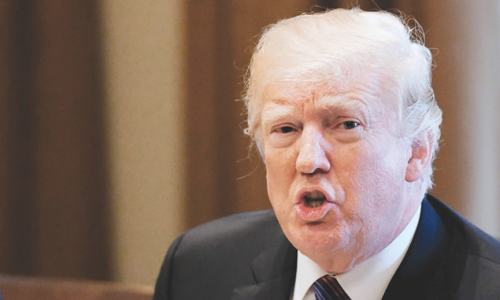PORT MORESBY: Asia-Pacific leaders failed on Sunday to bridge gaping divisions over trade at a summit dominated by a war of words between the US and China as they vie for regional influence.
For the first time, APEC leaders were unable to agree on a formal written declaration amid sharp differences between the world’s top two economies over the rules of global trade.
Take a look: Trump’s trade war
“You know the two big giants in the room. What can I say?” said host and Papua New Guinea Prime Minister Peter O’Neill, conceding defeat.
Canada’s Prime Minister Justin Trudeau admitted the failure came down to “different visions on particular elements with regard to trade that prevented full consensus.”
Sources said going into the meeting the United States had pressed for the leaders to issue what amounted to a denunciation of the World Trade Organisation and a call for its wholesale reform. That demand was a step too far for Beijing, which would likely get less preferential treatment under any changes.
O’Neill indicated the WTO had been a sticking point in agreeing a joint communiqué.
“Apec has got no charter over the World Trade Organisation. That is a fact,” he said. “Those matters can be raised at the World Trade Organisation.”
For the first time, Asia-Pacific leaders fail to agree on joint statement
The spat ramps up the stakes for a crunch meeting between Presidents Donald Trump and Xi Jinping at a G20 summit in Argentina at the end of the month.
O’Neill denied it was a humiliation for his poverty-hit country, which was hosting the annual gathering of the 21 nations for the first time.
As tensions boiled over, police were called when Chinese officials attempted to “barge” into the office of PNG’s foreign minister in an eleventh-hour bid to influence a summit draft statement, three sources with knowledge of the situation said.
Chinese foreign ministry official Zhang Xiaolong denied the incident, telling reporters: “It’s not true. It’s simply not true.”
Even before the summit started, tensions between the two big hitters came to the fore with Xi and US Vice President Mike Pence crossing swords in competing major policy speeches.
Pence warned smaller countries not to be seduced by China’s massive Belt-and-Road infrastructure programme, which sees Beijing offer money to poorer countries for construction and development projects.
The “opaque” loans come with strings attached and build up “staggering debt”, Pence charged, mocking the initiative as a “constricting belt” and a “one-way road”.
In a speech to business leaders just minutes before Pence, Xi insisted the initiative was not a “trap” and there was no “hidden agenda” — amid criticism that it amounts to chequebook diplomacy in the region.
Xi also lashed out at “America First” trade protectionism, saying it was a “short-sighted approach” that was “doomed to failure”.
Pence told reporters on Sunday: “I spoke to President Xi twice during the course of this conference. We had a candid conversation.”
He told him the US is interested in a better relationship with China “but there has to be change” in Beijing’s trade policies.
With fears that a trade war between the two rivals could cripple the Pacific Rim economy, some attendees voiced concern about the growing rivalry for influence in the region.
Published in Dawn, November 19th, 2018














































